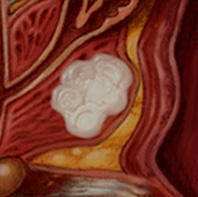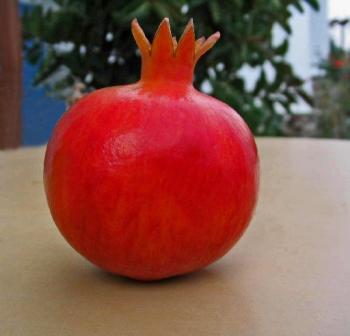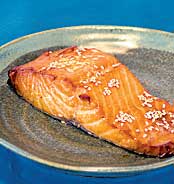 About 15 years ago, researchers in the US published the results of a study showing that taking selenium supplements lowered the risk of prostate cancer.
About 15 years ago, researchers in the US published the results of a study showing that taking selenium supplements lowered the risk of prostate cancer.
Now, researchers in the UK have examined all the available evidence for selenium intake, selenium levels in the body, and prostate cancer risk. Continue reading Does selenium reduce the risk for prostate cancer? →
 The Selenium and Vitamin E Cancer Prevention Trial (SELECT) found no reduction in risk of prostate cancer with vitamin E supplements.
The Selenium and Vitamin E Cancer Prevention Trial (SELECT) found no reduction in risk of prostate cancer with vitamin E supplements.
As a follow-up, researchers in the US determined the long-term effect of vitamin E and selenium in relatively healthy men. Continue reading Vitamin E and an increased risk of prostate cancer →
 Saw palmetto (Serenoa repens) fruit extracts are used for treat lower urinary tract symptoms attributed to benign prostatic hyperplasia (BPH).
Saw palmetto (Serenoa repens) fruit extracts are used for treat lower urinary tract symptoms attributed to benign prostatic hyperplasia (BPH).
Researchers in the Complementary and Alternative Medicine for Urological Symptoms (CAMUS) Study Group report the response to increasing doses. Continue reading Failure of saw palmetto to reduce BPH symptoms →
 The Financial Times reports, “A new hybrid variety richer in chemicals linked to a reduced risk of cancer and cardiovascular problems goes on sale on Tuesday” in the UK.
The Financial Times reports, “A new hybrid variety richer in chemicals linked to a reduced risk of cancer and cardiovascular problems goes on sale on Tuesday” in the UK.
Here’s what we know. Continue reading Hybrid broccoli →
 There’s no sure way to prevent prostate cancer, according to the Mayo Clinic staff, but here are their dietary recommendations. Continue reading Lower your risk for prostate cancer →
There’s no sure way to prevent prostate cancer, according to the Mayo Clinic staff, but here are their dietary recommendations. Continue reading Lower your risk for prostate cancer →
 Researchers at the University of California San Francisco examined the value of vigorous activity and brisk walking after diagnosis on the risk of prostate cancer progression. Continue reading Value of physical activity after diagnosis of prostate cancer →
Researchers at the University of California San Francisco examined the value of vigorous activity and brisk walking after diagnosis on the risk of prostate cancer progression. Continue reading Value of physical activity after diagnosis of prostate cancer →
 High-grade prostatic intraepithelial neoplasia (HGPIN) is a precursor of invasive prostate cancer (PCa). Some preliminary evidence suggests vitamin E, selenium, and soy protein may prevent progression of HGPIN to PCa.
High-grade prostatic intraepithelial neoplasia (HGPIN) is a precursor of invasive prostate cancer (PCa). Some preliminary evidence suggests vitamin E, selenium, and soy protein may prevent progression of HGPIN to PCa.
Researchers at Princess Margaret Hospital, in Toronto, Ontario tested this hypothesis. Continue reading Vitamin E, selenium, + soy to treat prostate cancer? →
 The value of pelvic floor muscle training on the recovery of urinary continence after removing the prostate is controversial, according to researchers at the University of São Paulo School of Medicine, in Brazil.
The value of pelvic floor muscle training on the recovery of urinary continence after removing the prostate is controversial, according to researchers at the University of São Paulo School of Medicine, in Brazil.
They studied biofeedback + pelvic floor muscle training to improve urinary incontinence following radical prostatectomy. Continue reading Biofeedback for men undergoing prostatectomy →
 Men increasingly use herbal remedies to treat bothersome lower urinary tract symptoms due to benign prostatic hyperplasia. Yet, study results with these products are inconsistent.
Men increasingly use herbal remedies to treat bothersome lower urinary tract symptoms due to benign prostatic hyperplasia. Yet, study results with these products are inconsistent.
Researchers from Princess Margaret Hospital, in Toronto, Ontario think it might be due to contamination of these products Continue reading Searching for contamination in herbals used to treat benign prostatic hyperplasia →
 Soy isoflavones sensitize prostate cancer cells to radiation. They also have antioxidant and anti-inflammatory activity, which might help prevent the side effects of radiation.
Soy isoflavones sensitize prostate cancer cells to radiation. They also have antioxidant and anti-inflammatory activity, which might help prevent the side effects of radiation.
Researchers at Wayne State University, in Detroit, Michigan, studied the effects of soy isoflavone supplementation on the toxicity of external beam radiation therapy in patients with localized prostate cancer. Continue reading Combining soy isoflaones plus radiation for prostate cancer →
 The risk of prostate cancer varies 60-fold depending on where in the world you are. This suggests a role for lifestyle and dietary factors in its cause.
The risk of prostate cancer varies 60-fold depending on where in the world you are. This suggests a role for lifestyle and dietary factors in its cause.
Researchers at McGill University Health Centre, in Montreal, Quebec looked for evidence of an association with diet. Continue reading Searching for a connection between fish consumption and prostate cancer →
 Men with prostate cancer who consumed the active compounds in green tea demonstrated a reduction in test results that predict prostate cancer progression, according to researchers at LSU Health Sciences Center-Shreveport, in Louisiana. Continue reading Preventing prostate cancer progression with green tea →
Men with prostate cancer who consumed the active compounds in green tea demonstrated a reduction in test results that predict prostate cancer progression, according to researchers at LSU Health Sciences Center-Shreveport, in Louisiana. Continue reading Preventing prostate cancer progression with green tea →
 The Advertising Standards Authority (ASA) told POM Wonderful that their UK billboard showing a bottle of pomegranate juice and a hangman’s noose, and proclaims the juice can “cheat death” must be taken down.
The Advertising Standards Authority (ASA) told POM Wonderful that their UK billboard showing a bottle of pomegranate juice and a hangman’s noose, and proclaims the juice can “cheat death” must be taken down.
ASA says “We considered the evidence… but concluded that it fell short of showing any direct relation between consuming the product and a longer life.”
So, what’s the evidence? Continue reading Reviewing pomegranate research →
 Hot flashes are a common side effect of androgen ablation therapy — a well-established treatment for various stages of prostate cancer.
Hot flashes are a common side effect of androgen ablation therapy — a well-established treatment for various stages of prostate cancer.
Researchers at Weill Medical College of Cornell University, in Brooklyn, New York, report positive effects with acupuncture. Continue reading Acupunture for hot flashes in men with prostate cancer →
 Researchers from the University of California, San Francisco report that omega-3 protects against advanced prostate coancer.
Researchers from the University of California, San Francisco report that omega-3 protects against advanced prostate coancer.
And there’s a COX-2 genetic connection. Continue reading Omega-3 and advanced prostate cancer →
 The effects of folic acid-containing supplements may differ from natural sources of folate, according to the University of Southern California, Los Angeles. Continue reading Folic acid and prostate cancer risk →
The effects of folic acid-containing supplements may differ from natural sources of folate, according to the University of Southern California, Los Angeles. Continue reading Folic acid and prostate cancer risk →
 After 10 years of research, here’s what we know about eating legumes — lentils; split, chick, and black-eyed peas; kidney, navy, and black beans — and the risk of prostate cancer.
After 10 years of research, here’s what we know about eating legumes — lentils; split, chick, and black-eyed peas; kidney, navy, and black beans — and the risk of prostate cancer.
Let’s start with the latest results from researchers at the University of Hawaii in Honolulu. Continue reading Eating legumes to reduce prostate cancer risk →
 Men with chronic prostatitis or chronic pelvic pain syndrome (CP/CPPS) have persistent discomfort or pain in the pelvic area that lasts several months, often longer. Discomfort is usually at the base of the penis and around the anus and lower back. Sometimes it spreads into the testes. The cause isn’t known.
Men with chronic prostatitis or chronic pelvic pain syndrome (CP/CPPS) have persistent discomfort or pain in the pelvic area that lasts several months, often longer. Discomfort is usually at the base of the penis and around the anus and lower back. Sometimes it spreads into the testes. The cause isn’t known.
Researchers at Justus-Liebig-University of Giessen, in Germany studied the response to pollen extract (Cernilton). Continue reading Pollen extract to treat chronic pelvic pain syndrome →
Complementary and Alternative Medicine: Fair, Balanced, and to the Point
 About 15 years ago, researchers in the US published the results of a study showing that taking selenium supplements lowered the risk of prostate cancer.
About 15 years ago, researchers in the US published the results of a study showing that taking selenium supplements lowered the risk of prostate cancer.




 Men with prostate cancer who consumed the active compounds in green tea demonstrated a reduction in test results that predict prostate cancer progression,
Men with prostate cancer who consumed the active compounds in green tea demonstrated a reduction in test results that predict prostate cancer progression,  The Advertising Standards Authority (ASA)
The Advertising Standards Authority (ASA)  Researchers from the University of California, San Francisco
Researchers from the University of California, San Francisco  Men with chronic prostatitis or chronic pelvic pain
Men with chronic prostatitis or chronic pelvic pain